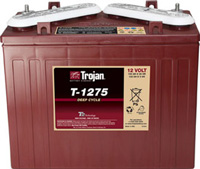Go Green

GO GREEN! Electric golf carts have increased in popularity for short commutes due to rising gas prices and an increasing awareness of environmental pollution and waste. Charging an electric golf cart costs approximately 30 cents, giving you a 25-35 mile range on a full charge. These savings quickly add up over time. Even better, electric golf cars reduce the harmful impacts placed on our environment. The time to go green is now!

Solar Roof Top Kits
Golf Cart Chargers and kits are easy to attach to the roof of a golf cart. People who utilize solar golf cart kits may also be able to qualify for the 30% Federal Tax for solar power.
The solar roof top kit...
- - Fits to all models and brands, using each cart's existing mounting system.
- - Is carbon neutral, ideal for environmentally sustainable golf course management.
- - Charges while in use, resulting in an increased range of 30%-50%.
- - Has Solar Powered Fleets which reduce electric grid consumption by 50%-75%.
- - Prolongs the life of costly batteries up to 50% more.
- - Does not affect the manufacturer's warranty.
Did you know?
1. One gallon of gasoline produces almost 20lbs of CO2.
Most of the weight of the CO2 does not come from the gasoline itself. It is produced during combustion of the engine and most comes from the oxygen in the air.
When the gas burns, carbon and hydrogen separate. The hydrogen combines with oxygen, making water (H2O), and carbon combines with oxygen forming carbon dioxide (CO2).
The two parts of oxygen make up the extra weight.
2. The average U.S. household will spend $3,475 a year fueling vehicles.
This is approximately 18,600 lbs of CO2 in one year!
3. If your golf cart substitutes 100 gallons of gas throughout the year, it is equivalent to saving 660lbs of waste going to a landfill.
...it is also equivalent to saving 37 cylinders of propane used for home barbequing OR saving over 2 barrels of oil from being consumed.
4. The typical lead-aced battery contains 60-80% recycled lead and plastic.
Go Green Fact:
Batteries Are Being Recycled at a Rate of 98%!

Go Green Factors
Electric golf cart batteries are recyclable. Lead-acid batteries are the environmental success story of our time.
In fact, a National Recycling Rate Study commissioned by Battery Council International (BCI) reveals that batteries are being recycled at a rate of 98 percent. Compared to 55% of aluminum soft drink and beer cans, 45% of newspapers, 26% of glass bottles and 26% of tires, lead-acid batteries top the list of the most highly recycled consumer product. The goal is to recycle all lead batteries.
Here's how it works:
The lead-acid battery gains its environmental edge from its closed-loop life cycle. The new lead-acid battery contains 60 to 80 percent recycled lead and plastic. Battery users return their used lead batteries to a drop-off site (such as our golf car service department), where they are sent back to the battery wholesaler (we use Safe-Start), then to secondary lead smelters. Secondary smelters melt and refine the lead plates and separate the plastic. Under strict environmental regulations, the lead and plastic are reclaimed and sent to a reprocessor for manufacture into new plastic products. The purified lead is delivered to the battery manufacturers and other industries. The acid is collected and either reused or treated.
Eventually, the original battery components may end up being used to make new lead batteries. The recycling cycle goes on indefinitely. That means the lead and plastic in the lead-acid battery in your golf car have been - and will continue to be - recycled many, many times. This makes lead-acid battery disposal extremely successful from both environmental and cost perspectives.
Sources:
"The Consumer Guide to Lead Battery Recycling" produced by the Battery Council International, www.batterycouncil.org
http://www.epa.gov/cleanenergy/energy-resources/calculator.html#results
Ryan Carpenter, Environmental Specialist
